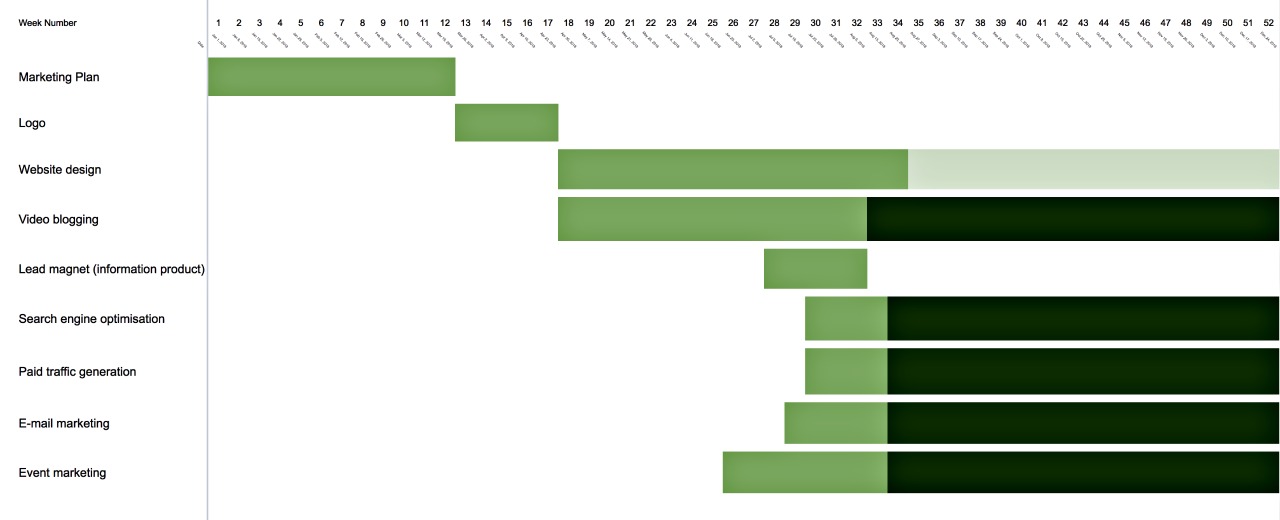How to get healthcare marketing projects completed on time and on budget (a client’s guide)
What are realistic timeframes for healthcare marketing projects?
In this post, we’ll share some of our standard timelines and orders of dependencies for healthcare marketing projects. We’ll break down a realistic timeframe for a website project, showing you why a good website takes the time it does. To make the exercise a bit more relevant, let’s also attach some sample dates starting January 1st, 2018.
Realistic timelines for healthcare marketing projects
You’ll want to click on this image below to see it

The critical triangle for healthcare marketing projects
The project management triangle is a useful adage to turn to when answering questions like these. You can see the simplified version of the triangle below. We’ve included a similarly-themed Venn diagram showing the constraints:
The premise of this diagram is that everyone wants the top quality, for the least cost, in the least amount of time. The problem is that you can’t have all three of these outcomes – you can only pick two. By choosing just two priorities, the third option will inevitably suffer
The GANTT chart above shows the ideal timelines and dependencies that healthcare marketing projects require. For example, the first project to complete is (ideally) the marketing plan – which in this case starts in Week 1 (the first week of January). In this case, we are showing both the market opportunity plan and the marketing plan. Once the marketing plan is complete, it informs the logo design, which can begin in the third week of March. Once we have the logo finished near the end of April, then we can use that visual language to inform our design of everything else that follows.
The website is central to any digital marketing plan, so in this suite of tactics, the website takes precedence above all. Let’s say this project begins Week 18 (around May 2018). We time the other projects to complete one week before the site goes live in Week 34 (the week starting August 20th).
Another vital dependency is the lead magnet – information product. This project can’t start before Week 28 (July 9th), because we need the transcribed material from the videos in the video blogging project (which we expect Week 27 – week commencing July 2nd), so it must start after we copy the videos.
The e-mail marketing project depends on the lead magnet, so the latter project must begin shortly (Week 29 – the week starting July 16th) after the former.
Lastly, you may note that there are some light green timelines and dark green timelines. The light green bar refers to web maintenance, which is necessary but is behind the scenes starting Week 35 (the week of August 27th). Web maintenance is the work involved in keeping the site secure and technically up to date which is a job that theoretically never ends.
The dark green bars indicate where a project continues with iterations. For example, the video blogging doesn’t stop (typically) for another 26 to 52 weeks after it launches in Week 34 (the week of August 6th), because posts go out either biweekly or weekly after that date. An SEO and blogging project continues on a monthly cycle of new content additions and optimisations. The paid traffic generation continues every month with optimisations to ad buying campaigns. E-mail marketing continues indefinitely as new subscribers get lead magnets. Event marketing continues on a monthly basis as we plan new events, promote them, and debrief them.
Typical lengths of healthcare marketing projects
The table below illustrates the standard realistic timelines for the healthcare marketing projects we typically deliver.
| Marketing opportunity analysis | 6 weeks |
|---|---|
| Marketing plan | 6 weeks |
| Logo | 5 weeks |
| Website | 17 weeks |
| Video blogging | 15 weeks |
| Lead magnet – information product | 5 weeks |
| Search Engine Optimisation (Prep phase) | 5 weeks |
| Paid traffic generation (Prep phase) | 5 weeks |
| E-mail marketing (Prep phase) | 5 weeks |
| Event marketing (Prep phase) | 9 weeks |
A typical website design timeline
Finally, this table shows an in-depth look at the timeline of a website project, which is the most common project we provide.
| Website design milestone | Start week | End week |
|---|---|---|
| Assets Collected – Ready to start | Week 1 | Week 2 |
| Concept Board Approved – Ready to Write & Design | Week 3 | Week 4 |
| Information Architecture Approved – Ready to Write & Design | Week 5 | Week 6 |
| Written Content Prepared – Ready to be populated | Week 7 | Week 8 |
| Website Designed – Ready to insert copy | Week 9 | Week 11 |
| Content populated – Ready to optimise for search | Week 12 | Week 13 |
| Optimised for search – Ready for testing | Week 14 | Week 15 |
| Website has been tested – Ready to be launched | Week 16 | Week 17 |
| Website Launched – Ready to clean up | Week 17 | Week 17 |
As a client, how can you help get marketing projects done on time and on budget?
Client budgets govern timelines because doing it faster costs more money in less time. You can maximise speed with the following approaches:
- hire an experienced marketing consultant with knowledge of your industry and the types of projects you want to complete
- smooth the way for your marketing consultant by making sure you (as the client) are prompt with everything they need from you (typically, that’s content, feedback and approvals)
- agree to realistic timeframe, so you don’t pay a priority rate to get things done faster than is realistic
Hire an experienced and industry-specific marketing consultant
You might think you can delegate marketing planning and execution to practice managers. We have found that the idea of expecting an already overworked practice manager (or any other staff member) who has little or no experience with marketing planning or execution is hugely unrealistic.
Furthermore, you want to get down to business as quickly as possible, and that requires your marketing consultant to be up to speed with your industry, your market, your competitors, your product or service specifications, your advantages, and the benefits you offer your customers.
Work with your marketing consultant to make progress as smooth and delay-free as possible
Surgeons must provide a significant amount of raw content, and this takes a lot of time to get. You’ll need to manage your time to budget for at least 1 to 2 hours of content development, review and approval per week for most projects.
For example, in the website project timeline above, the client must involve themselves in the following milestones:
- providing assets (logos, photographs, papers, content) in week 1
- reviewing and approving the concept board (the visual plan) in week 2 and 3
- reviewing and approving the information architecture (the site organisation plan) in week 4 and 5
- reviewing and approving prepared content for week 7
- reviewing and approving the final website in week 17
As you can see, most marketing projects take many weeks to complete, and that’s when approvals are fast and forthcoming. Often, surgeons take much longer than the five business days we suggest to approve things. Sometimes they take many weeks to review and approve what we do. Sometimes even longer. In some cases, we can proceed without the client’s approval. In other cases, future decisions depend so much on the current choices at hand that we cannot continue, so we must wait.
Sometimes, clients change their minds. One case I can specifically recall where a client affected the start of a video blogging project by changing their mind, was when the client chose to change their logo. Once we redesigned the logo, the video blogging could then begin.
It probably goes without saying that if something materially changes in your business then you must inform your marketing consultant as quickly and clearly as possible to avoid wasted time and effort.
Plan and don’t needlessly rush things
Remember the project management triangle. If you want it good and fast, then you’ll have to pay more. Further, expecting a deadline to remain locked while you delay the project with content, review and approvals is unrealistic. Yes, your marketing consultant may be able to speed things up to work around your delays without charging you extra, but then quality might suffer. At the end of day, most people would agree that getting things quickly is important, but getting them right is critical.
